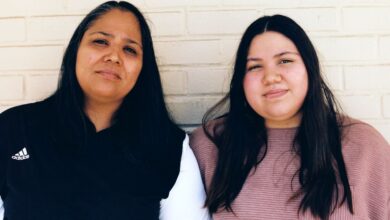How parents should talk about racism to their children

“Don’t be afraid to learn together and explore things together and not always have those answers.”
Reconciliation Australia Board director Sharon Davis, a Bardi Kija person from the Kimberley, says that it can be helpful to model this process of learning for children.
“Parents can model anti-racism with their children by talking openly about how and why they might be feeling uncomfortable, and that they might need to go through a process of ‘unlearning’ and ‘relearning’.”
It starts with parents
“Having conversations with children about racism is important, but anti-racism needs to be lived and modelled by parents and teachers every day,” says Davis. “You can do this by understanding your own personal and cultural identity and the biases that you hold.”
Modelling anti-racism, they say, starts with “a zero-tolerance approach to racism at home and at school, and to hold people accountable. If a friend, family member or even a stranger makes a racist remark, address it in the moment (if safe to do so) and follow up soon after with your child.”
Conversations with children under five
While they won’t be having complex conversations about race, children can understand the concept of difference from a young age. By six months, children can recognise cultural and physical differences, and can start to show signs of racial bias by age five.
Use simple language and concepts that kids can understand, says Woodhouse. Children can understand the idea of fairness at this age, so examples like sharing toys and helping friends can help them develop an understanding of basic kindness.
This is also the time to introduce children to a diverse range of role models. There’s a wealth of picture books by First Nations authors that adults can read with their children. Parents can also take their toddlers along to community workshops, music performances and exhibitions.
Davis also recommends encouraging inclusive friendships with other children at all ages.
“Creating opportunities for your kids to meet other kids of different backgrounds and different lifestyles is a way to break down some of those misconceptions and let them see that at the end of the day, there’s really great things about everyone.”
Conversations with primary school-aged children
By primary school, children are starting to develop a sense of self and their moral reasoning. Pierce says this is the right time for them to start learning about social justice. “They’re also developing those social and cognitive skills of empathy, learning to walk in someone else’s shoes and understanding how someone might feel if they’re left out because of where they come from.”
Asking questions like, “How would it feel if it was a friend that you really cared about and someone was saying nasty things about them?” can help kids frame behaviour in their own context.
Uink also suggests encouraging children’s natural curiosity by asking them to identify things they like about their friends from different cultures. “That’s a really nice tonic against anything they’re hearing negatively either online or within their community,” she says.
Loading
Once children start using social media, it’s important to help them cultivate digital literacy. And while parents will never have total control over their child’s internet use, there are things they can do. Davis suggests parents encourage children to unfollow creators who post harmful content and follow positive creators they can look up to. It can also be healthy for parents to introduce a cut-off time on phone use before bedtime, or have kids take a break for a few days if they are feeling overwhelmed.
How adults can help children navigate racism on social media
- Cut off access to social media a few hours before bedtime.
- Encourage children not to read the comments section.
- Seek out First Nations voices on social media and unfollow those who spread hate or misinformation.
- Have open communication with your children and encourage them to talk to you about what they’re seeing online.
- If your child is struggling, switch off the news and encourage them to take a break from social media.
In the context of the Voice, for example, parents can “talk openly with children about the types of conversations that are happening on socials, and how some of the ways in which people are engaging with the debate are racist”, says Davis.
“Ask children about the kinds of things that they are seeing and hearing about Aboriginal and Torres Strait Islander people on social media, and respond with curiosity, openness and information to help expand their understanding.”
At primary school level, children can also begin to explore using their agency to do something about racism. “One of the kids that I’ve been doing some work with has been putting together a project that he is going to share at assembly so that the school community understands what it’s like to be the subject of racism,” says Woodhouse.
Conversations with teenagers
By adolescence, children can start to deepen their understanding of the historical context of racism in Australia. Providing things like books, essays, newspaper articles and documentaries can help build on their knowledge of these issues. This “gives them an opportunity to see issues from another perspective – hearing real life experiences of racism can make kids think about things a bit differently and be more aware of bias, including their own bias”, says Woodhouse.
This can also be a good time to encourage kids to be involved in activism for a cause important to them, says Woodhouse. Taking them to rallies or talks, for example, can expose them to the many ways they can advocate for Indigenous Australians.
And as Davis points out, once children start to grow up, learning goes both ways. “Young people might know more than you think about racism and have strong opinions about it – so have open conversations to find out what they know.”
How, and where, parents can learn more (a non-exhaustive list)
Make the most of your health, relationships, fitness and nutrition with our Live Well newsletter. Get it in your inbox every Monday.





